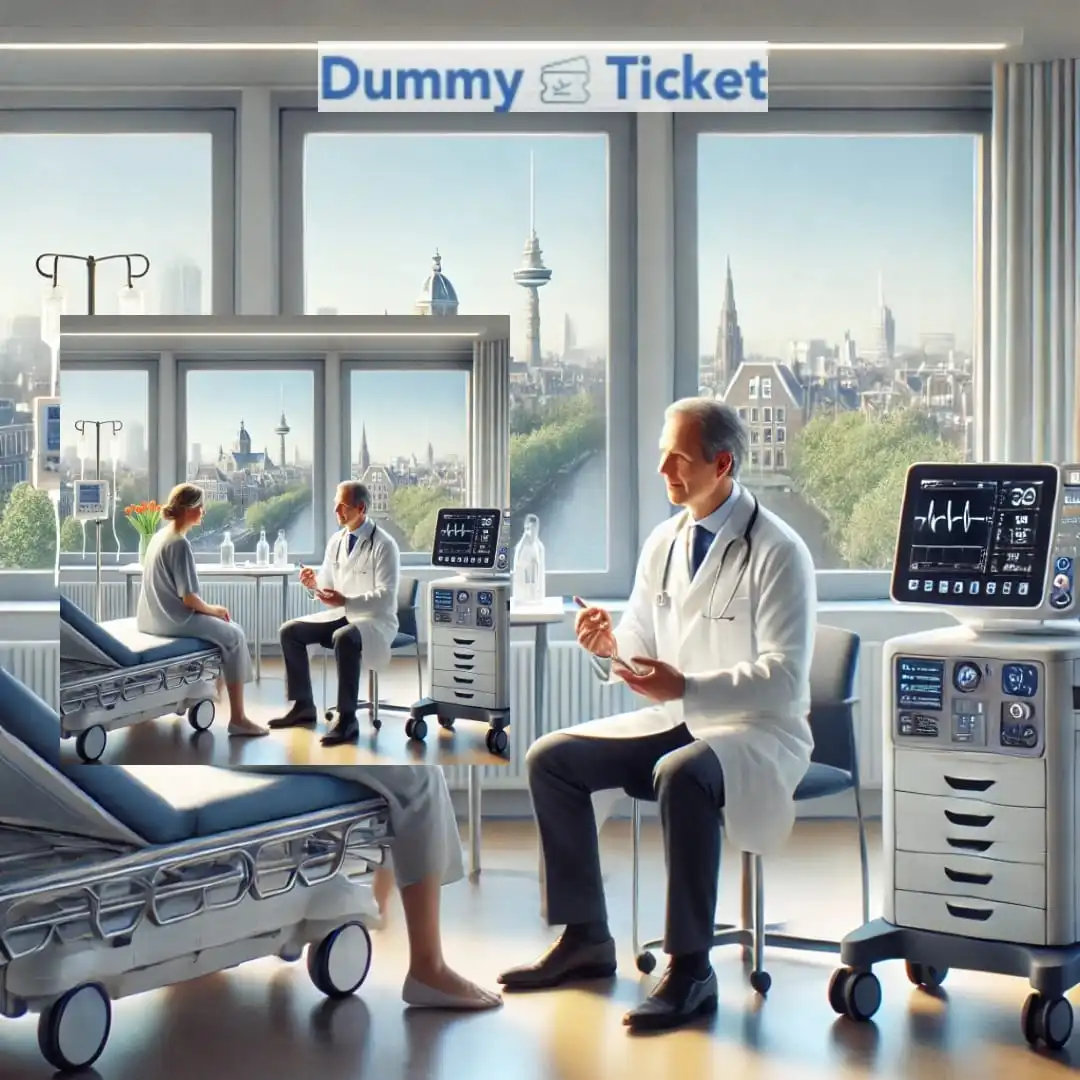Netherlands Schengen Visa for medical treatment
The Netherlands is one of the most popular destinations in the Schengen Area, attracting visitors with its stunning natural landscapes, charming canals, and rich history. If you plan to visit the Netherlands, you will need a Schengen visa if your country’s citizens are not exempt from visa requirements. In this article, we provide a comprehensive guide on how to obtain a Schengen visa for the Netherlands, including visa requirements, procedures, and costs.
What is a Schengen Visa for the Netherlands?
A Schengen visa is a permit that allows you to enter any of the Schengen Area countries, including the Netherlands, for a short stay of up to 90 days within a 180-day period. This visa is granted for various purposes, such as tourism, business, short-term studies, or family visits.
Types of Schengen Visas for the Netherlands
There are different types of Dutch Schengen visas based on the purpose of the visit:
- Tourist Visa: For sightseeing and enjoying a short vacation.
- Family or Friends Visit Visa: If you intend to visit a relative or friend.
- Business Visa: For attending business meetings or professional events.
- Short-term Netherlands visa for study : For training or educational courses lasting no more than 90 days.
- Medical Visa: For receiving treatment in the Netherlands.
- Transit Visa: For travelers passing through Dutch airports en route to another destination outside the Schengen Area.
Requirements for Obtaining a Schengen Visa for the Netherlands
To apply for a Schengen visa for the Netherlands, you must submit the following essential documents:
- Application Form:
Complete the Dutch Schengen visa application form online or manually. - Passport:
Valid for at least 3 months after your planned return.
Must have at least two blank pages. - Photographs:
Two recent passport-sized photos with a white background. - Proof of Purpose of Visit:
Invitation letter from your host in the Netherlands (for family or business visits).
Confirmed hotel booking or tour itinerary (for tourism). - Proof of Financial Means:
Bank statements for the last 3-6 months.
Employment letter or income certificate (if applicable). - Travel Insurance:
A policy covering the entire stay with a minimum coverage of €30,000. - Flight Tickets:
A preliminary booking of a round-trip ticket. - Proof of Accommodation:
Hotel reservation or invitation letter detailing your place of stay. - Visa Fee:
Payable at the time of application: €80 for adults, €40 for children aged 6-12.
Steps to Apply for a Schengen Visa for the Netherlands
- Determine the Purpose of Visit:
Choose the appropriate visa type based on your travel plans. - Schedule an Appointment:
Book an appointment at the Dutch embassy or authorized visa centers like VFS Global. - Collect Required Documents:
Ensure all the mentioned documents are prepared accurately. - Submit the Application:
Submit your application at the visa center or embassy, along with biometric data. - Wait for Processing:
Visa processing typically takes 15-30 days. - Receive Your Visa:
If approved, your visa will be stamped in your passport.
Reasons for Schengen Visa Rejection for the Netherlands
Your application may be rejected for several reasons, including:
- Insufficient financial proof.
- Incomplete or falsified documents.
- Unclear travel itinerary.
- Unreliable travel history.
Tips to Avoid Rejection
- Submit your application well in advance (2-3 months before travel).
- Ensure accuracy and completeness of your documents.
- Choose approved travel insurance providers.
- Provide a detailed and clear travel plan.
How Long is the Schengen Visa for the Netherlands Valid?
The Schengen visa allows you to stay in the Netherlands and other Schengen countries for up to 90 days within a 180-day period. In specific cases, you may be granted a multiple-entry visa for longer durations.
Costs of a Schengen Visa for the Netherlands
- Adults: €80.
- Children (6-12 years): €40.
- Children under 6 years: Free of charge.
- Additional costs: Visa center fees (~€25-30).
Frequently asked questions about the Netherlands Visa
1. Can I use a Schengen visa for the Netherlands to visit other countries?
Yes, you can travel to any Schengen country, provided the Netherlands is your primary destination.
2. Can I extend my Schengen visa for the Netherlands?
Extensions are only granted in exceptional cases, such as emergencies.
3. When is the best time to apply?
It’s recommended to apply 3 months before your planned travel date.
A Schengen visa for the Netherlands is the first step to exploring this enchanting country and enjoying a memorable experience in the heart of Europe. By following the guidelines and submitting accurate documents, you can increase your chances of obtaining the visa successfully. If you’re planning to visit the Netherlands, start preparing your paperwork now and get ready for an unforgettable trip.
The Best Hospitals in the Netherlands
The Netherlands is renowned for its advanced hospitals and cutting-edge medical technologies. Here are some of the top hospitals offering high-quality medical care:
- Amsterdam UMC (Amsterdam University Medical Center): Specializes in oncology and cardiology.
- Erasmus MC (Erasmus Medical Center): Provides advanced treatment for neurological disorders.
- UMC Utrecht (University Medical Center Utrecht): Known for rehabilitation programs and surgical treatments.
- LUMC (Leiden University Medical Center): Offers comprehensive medical services across various specialties.
Treatment Costs in the Netherlands
The cost of treatment varies depending on the type of care required. Here's an overview:
- Medical Consultation: €100–€300.
- Minor Surgeries: Starting at €2,000.
- Chemotherapy: €5,000–€10,000.
- Rehabilitation: €1,000–€5,000 per month.
Extending a Schengen Visa in the Netherlands for Medical Treatment
- In exceptional cases, you can request a visa extension if:
- The treatment exceeds the initially anticipated duration.
- The hospital provides a medical report justifying the extension.
- You have sufficient financial resources to cover additional costs.
Frequently asked questions about the Netherlands visa for medical treatment
- Can accompanying persons obtain a visa too?
Yes, companions can apply for a separate Schengen visa, with evidence supporting their need to accompany the patient. - Can I use a medical visa to travel to other Schengen countries?
Yes, but the Netherlands must remain your primary destination for treatment. - When should I apply?
It's advisable to apply 4–6 weeks before your planned travel date.
A Schengen visa for medical treatment in the Netherlands opens the door to advanced healthcare services offered by Dutch medical facilities. By carefully preparing your documents and submitting a comprehensive application, you can secure the visa and begin your treatment journey safely. If you’re planning to travel to the Netherlands for treatment, start your visa application preparation now and prepare for a premium healthcare experience.
Pros and Cons of a Netherlands Medical Treatment Visa
Advantages of the Netherlands Medical Treatment Visa
- Access to Advanced Medical Services:
The Netherlands offers world-class healthcare, specialized hospitals, and experienced doctors.
Cutting-edge technologies and innovative treatments in fields like oncology, heart surgery, and rare diseases. - Unified Procedures Across the Schengen Area:
A medical visa for the Netherlands is a Schengen visa, allowing travel to other Schengen countries under specific conditions.
Opportunities for visiting neighboring countries like Germany or Belgium for other purposes during the treatment period. - Family Support:
The visa allows separate applications for accompanying family members, providing emotional support to the patient. - Reasonable Visa Validity:
Typically valid for up to 90 days, sufficient for many treatments.
Possibility of extension in necessary cases. - Streamlined Application Process:
Clear procedures if you have a medical report and recommendations from a recognized healthcare provider.
Dutch embassies and visa centers offer guidance and support. - Mandatory Medical Insurance:
Visa applicants must have medical insurance covering up to €30,000 for emergencies, ensuring financial protection. - Comfortable Environment:
The Netherlands is known for its high quality of life and tranquil surroundings, aiding in patient recovery.
Disadvantages of the Netherlands Medical Treatment Visa
- High Costs:
Healthcare in the Netherlands can be expensive compared to other countries, including medical and living expenses.
Hospitals may require upfront payments before starting treatment. - Stringent Financial Requirements:
Proof of financial capability to cover treatment and accommodation expenses is mandatory.
Long-term treatments may necessitate additional funding sources. - Complex Application Process:
Gathering and translating documents can be tedious.
Incomplete or unclear plans may lead to application rejection. - Short Visa Validity:
Usually valid for 90 days; treatments requiring longer periods might face visa extension challenges. - Dependence on Hospital Schedules:
Securing treatment appointments may take time due to high demand.
Coordination between hospital schedules and visa duration is essential. - Risk of Rejection:
Visa applications may be denied due to incomplete documents or doubts about the purpose of travel.
Application fees are non-refundable upon rejection. - Separate Visa for Companions:
While family members can accompany, they need to apply for their own visas, involving extra costs and procedures. - Unsuitability for Long-Term Treatments:
Designed for short-term care, it’s not ideal for extended treatment plans requiring long-term follow-up.
How to Minimize the Drawbacks of a Medical Visa?
- Plan Ahead: Book hospital appointments and prepare documents well before applying.
- Seek Professional Help: Consult visa experts to ensure a smooth and complete application process.
- Secure Financial Stability: Maintain sufficient funds and provide credible evidence of your financial means.
- Choose Comprehensive Medical Insurance: Opt for insurance that covers all potential emergencies.
Temporary Flight Reservation for Visa Applications
When applying for a Schengen visa for medical treatment in the Netherlands, you need to submit a complete travel itinerary, including proof of a round-trip flight reservation. However, purchasing an actual ticket is not required before the visa approval. Instead, you can provide a Dummy flight Ticket.
What is a Dummy Flight Ticket?
- A document showing a booked round-trip flight without full payment.
- Obtainable through travel agencies or specialized online services.
- Serves as proof of intent to return after treatment.
Why is a Dummy flight Ticket Required?
- Travel Plans Verification: Confirms your planned travel to the Netherlands and return.
- Avoiding Financial Loss: Prevents paying for a non-refundable ticket if the visa is denied.
- Consistency with Medical Schedule: Ensures flight dates align with hospital appointments.
How to Obtain a Temporary Flight Reservation?
- Travel Agencies:
Many agencies offer reservations for a small fee. - Airlines:
Some airlines provide temporary holds on tickets for 24–72 hours. Online Platforms:
There are many sites that website this serviceYou can book a Dummy flight Ticket through our website, Dummy Ticket, as it provides you with this service easily, quickly, and at the lowest cost.
Why Should You Book Through Our Website?
Option 1 (Focus on Ease of Use):
If you are looking for an easy and quick way to book a Dummy flight Ticket, our website Dummy Ticket provides you with this service at the lowest possible cost. You can now obtain a Dummy flight Ticket in just a few simple steps.Option 2 (Focus on Speed and Efficiency):
Do you urgently need to book a Dummy flight Ticket? The Dummy Ticket website allows you to complete this process with exceptional speed and efficiency, while guaranteeing the lowest cost for obtaining this essential service.Option 3 (Focus on Savings):
Don't let exorbitant costs hinder your plans. Through our website Dummy Ticket, you can book a Dummy flight Ticket at the lowest available prices, all while enjoying a smooth and convenient booking experience.Option 4 (More Comprehensive Article Wording):
In the world of travel, you may sometimes need to secure a Dummy flight Ticket for various purposes. The Dummy Ticket website offers you an effective solution for this need, where you can easily and quickly obtain a Dummy flight Ticket at a highly competitive cost.
Key Tips:
Ensure the reservation matches the treatment period.
Choose a provider whose bookings are verifiable by the embassy.
Only purchase a confirmed ticket after receiving the visa.
Traveling to the Netherlands for medical treatment requires a temporary flight reservation as part of the visa application process. This practical option meets embassy requirements while avoiding financial risks if the visa is declined.




